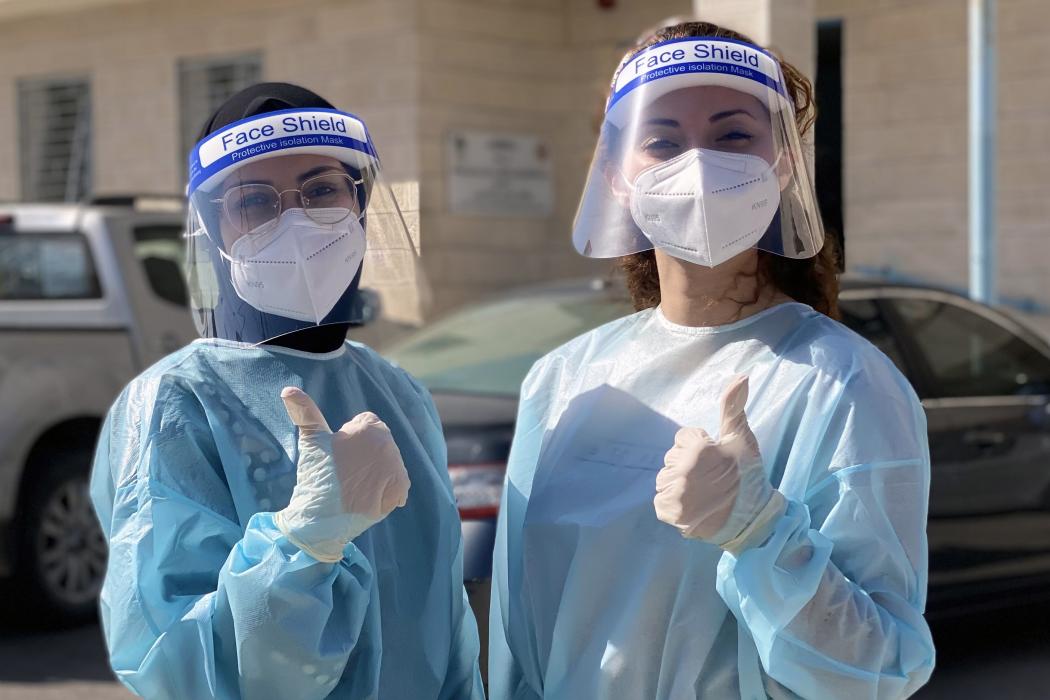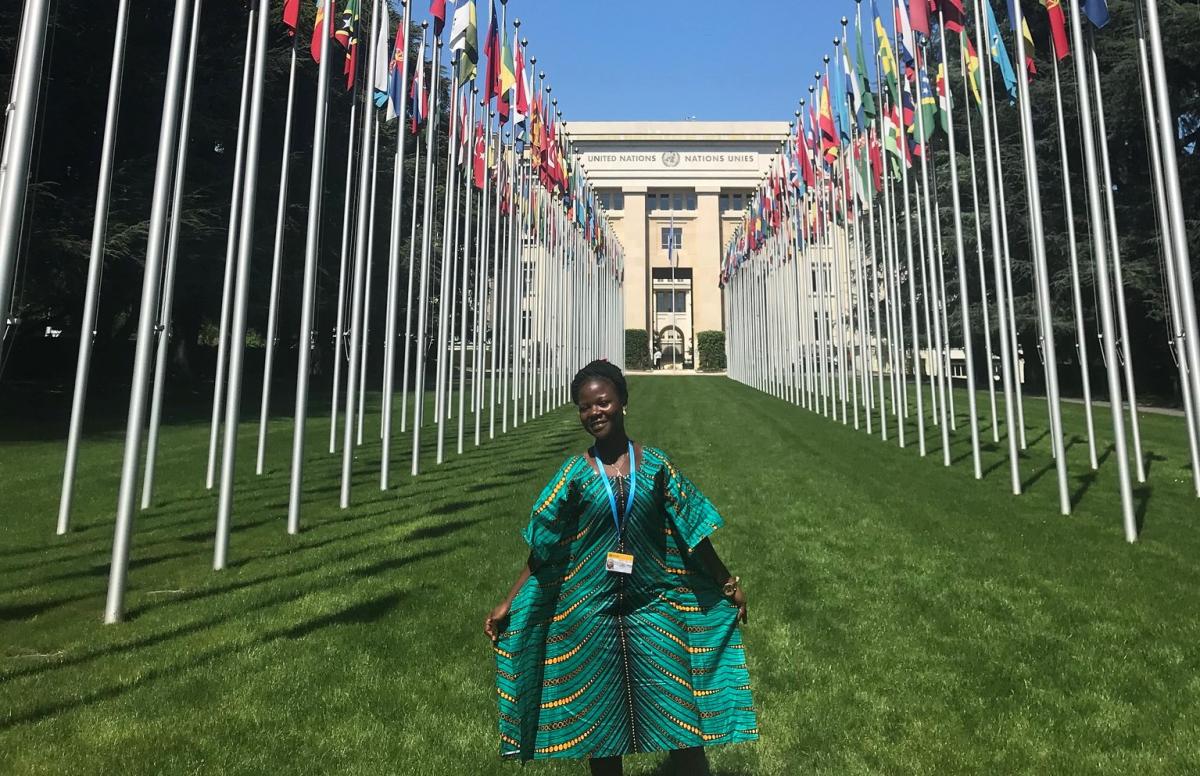This Is a Big Moment for Health Workforce Advocacy and Policy Change.

Photo by Zoya Shehadeh for URC/the USAID Jordan Health Service Quality Accelerator Activity
Here are some of the wins and opportunities the Frontline Health Workers Coalition is tracking.
Right now could be a turning point for health workforce advocacy to increase support and protection for health workers, especially in low- and middle-income countries, as they continue responding to the pandemic and providing access to essential health services.
In the last weeks, the US and the African Union announced new global and regional health workforce initiatives. Advocates, health workers, and policymakers around the globe participated in World Health Worker Week and joined our call for policymakers to take urgent actions to build the health workforce back better. The World Health Organization (WHO) and others released new health workforce data and policy documents. And just last week, the US Senate confirmed a major health worker champion to lead PEPFAR.
As we prepare for the Second COVID-19 Summit on May 12 (watch it at 9 am ET here) and the 75th World Health Assembly later this month, here are key moments we can build on to secure policy change health workers need.
The White House shared its plans for a global health workforce initiative
At the end of March, the White House submitted its budget proposal to Congress for fiscal year 2023, requesting $1 billion for a new “Global Health Worker Initiative.” This unprecedented initiative would advance the safety of health workers, strengthen health workforce data and decision-making, ensure equity for women health workers, and more.
The White House also requested $10 million for a new “Health Resilience Fund” that, among other things, would provide support for the global health workforce and health workforce information systems.
Our coalition is looking forward to the official launch of the Global Health Worker Initiative tomorrow, May 11, at 8:30 am ET. We'll keep calling on Congress to enact the initiative, and provide more funding for core global health and pandemic preparedness to ensure strong country health systems to end the COVID-19 pandemic and better prepare for future emergencies. We’re also urging Congress, alongside Representative Bera and 14 other members of the US House of Representatives, to approve a new budget line for the Health Resilience Fund.
The USAID lead on the Global Health Security Agenda said there’s no health security without health workers
During an event on April 6, Health Workers Matter for Global Health Security: Here’s Why, IntraHealth International and experts from Africa and the US explored how to increase global health security by investing in health workers.
“Historically, global health security funding for the health workforce has focused on training field epidemiologists,” said IntraHealth President Polly Dunford. “We must expand our definition of global health security to include frontline health workers.”
“Health systems can only work if there are health workers,” said Richard Greene, USAID lead on the Global Health Security Agenda. “It’s also true for health security—there’s no health security without health workers.” Greene noted that health workers, especially CHWs, are critical for USAID’s health development work. “Without localized development and more [health] workers in rural and remote areas, high mortality rates will remain, new threats will go undetected, and outbreaks will spread.”
“We must begin investing in the health workforce on the continent,” said Ahmed Ogwell Ouma, Africa CDC’s deputy director and its lead on health security. “And by investing, we don’t mean get thousands of millions of dollars for health workforce. We mean starting small and expanding sustainably, to get resources constantly for building the capacity of health workers.”
In its recent budget proposal, the White House also included a $300 million increase for pandemic preparedness funding, plus $4.5 billion in multiyear funding. The coalition is highlighting that any new funding for pandemic preparedness and response should include support for a wide range of health workers.
CHWs raised their voices
It’s clear CHWs want their impact and needs known by policymakers. The brand new Community Health Worker Champions Network (CHW-CN) in Kenya submitted the first video to our “Build the Health Workforce Back Better” testimonial campaign in April. Then its members submitted 11 more videos.
“We community health workers, we need to be counted, we need to be protected, and we need to be paid!” shouted members of the CHW-CN, the first official network providing a unified voice for CHWs in Nairobi.
CHWs are critical for expanding access to essential health services, especially for people living in rural and remote areas. Recent data show supported and protected CHWs in sub-Saharan have been able to maintain delivery of community-based services during the pandemic. In the Community Health Worker Voices on UHC webinar hosted by Communities at the Heart of UHC Campaign, CHWs shared their experiences delivering maternal and child health services, and what they need to do their work effectively.
“I visit sick children and do treatments and tests. If a malaria test is positive, I give paracetamol and follow-up after three days to make sure the child is progressing,” said Millicent Miruka, a CHW in Kenya. “With COVID, we need protective gear to protect ourselves, so we can go out in our communities and educate them on how they can protect themselves,” Susan Magulu, a CHW in Uganda said.
The coalition will continue working with our members like the Community Health Impact Coalition to amplify that governments and donors need to count CHWs, pay CHWs, and provide tools like advocacy training so they can be even more active in local and global advocacy.
Women in global health called out women’s unpaid and underpaid work
In April Women in Global Health held an event to share findings from its new policy report, Subsidizing global health: Women’s unpaid work in health systems. The report shows six million women are working unpaid or underpaid in community health roles.
“Health systems are fragile because they are relying on unpaid work. We’re not effectively training the backbone of the delivery system,” said Linda Etim, special assistant to President Biden and Senior Director for Development, Global Health, and Humanitarian Response at the White House National Security Council. “We also know women in these spaces are overburdened, overworked, and suffer disproportionately from mental health strains.”
The report recommends governments follow the WHO’s guidelines for CHWs and create opportunities for unpaid workers to train for formal health sector roles. It also recommends donors and nongovernmental organizations ensure their programs do not perpetuate unpaid work.
Etim shared how the US administration is taking action. “In many of our programs, especially PEPFAR and PMI, we used to have rules that would disallow us from funding CHWs,” she said. “Those stipulations have been revised, in deep consultation with community leaders and the workforce, so you’ll see those adjustments in the basic policy.” The coalition is pushing for all US global health programs to change policies to allow for health worker remuneration.
A new report by White Ribbon Alliance shows midwives around the world are underpaid and many have to take on additional jobs to support themselves and their families. "I’ve worked as a midwife for 15 years and have never once been promoted," said Jackline Chebet in Uganda. "I want the government to value midwives by giving them adequate pay."
The African Union announced its health workforce initiative
On April 8, the Africa Union, Africa CDC, and Seed Global Health held an event, Africa Leads the Way: A Compact for a 21st Century Health Workforce, to discuss a new African health workforce initiative.
“The most important lesson I have learned during the COVID-19 pandemic is the critical role of the [health] workforce in responding to any pandemic or endemic disease," said John Nkengasong, then the director of Africa CDC.
Nkengasong has served on the AU’s Covid-19 Commission, which decided in February to establish a Health Workforce Task Team to define the health workforce needs for the continent and set targets for health workers, including nurses, midwives, and doctors. “We’re determined to work with partners–multilaterals, bilaterals, and foundations–to address the critical gap of health workforce development," Nkengasong said.
Over the coming months, the new Task Team will create an African-led framework and produce a compact to harmonize governments, donors, and partners towards a single vision for Africa’s health workforce. We will keep our ears perked for how to support this important work, and look forward to working with Nkengasong in his new role as head of PEPFAR.
US policymakers spoke up for health workers
During #worldhealthworkerweek, I want to say, "thank you!" to all those who work in global health, particularly our @USAIDGH staff and those fighting on the front lines of #COVID19 and other crises around the world. #HWHero pic.twitter.com/Bov2dtwkrt
— Atul Gawande (@GawandeUSAID) April 4, 2022
As our coalition is advocating for the US to invest more in health workers in partner countries, we are encouraged every time we hear key US policymakers voice their support.
On April 4, USAID’s Assistant Administrator for Global Health Atul Gawande shared a video listing five ways USAID is protecting and supporting health workers around the world, including ensuring they have access to protective equipment and Covid vaccines.
At a Skoll World Forum event on April 7, Raj Panjabi of the National Security Council spoke in his capacity as a member of the Skoll Board, pointing out we need to do more to support our primary caregivers, often CHWs. “The first priority, whether you’re a nonprofit, a philanthropist, a policymaker, has to be to care for the caregivers,” he said. “Starting with supporting them, equipping them, training them, but it also has to extend to paying them. The notion that any provider should work for free is something that should be relegated to history books and seen as a moral offense of biblical proportions.”
Last week, USAID Administrator Samantha Power tweeted that health workers are critical for getting Covid vaccines in arms and building community trust.
What’s Next

Albertha Freeman, nurse supervisor with Liberia’s National Community Health Assistant Program at the World Health Assembly. Photo courtesy Last Mile Health.
It’s obvious we can’t let this momentum toward policy change for health workers die down. The WHO also announced last week that the number of deaths associated with Covid-19, either directly or indirectly due to overburdened health systems, are likely three times higher than reported. Currently only 15.8% of people in low-income countries have received at least one dose of a Covid-19 vaccine, which means new variants will likely emerge and more people will suffer and die from the virus. Since enough skilled health workers are required to administer vaccines to everyone in need, we’re eagerly awaiting more key workforce advocacy opportunities coming up this month.
The Second Global Covid-19 Summit, which is on International Nurses Day, will emphasize the need to expand and protect the health workforce to end the pandemic, and is an opportunity for government leaders to make new commitments for the health workforce.
Several coalition member organizations will participate in the World Health Assembly, hold high-level events on the health workforce, and weigh in on new WHO policy documents, including the Working for Health: draft 2022–2030 action plan and Global strategy on human resources for health: workforce 2030.
We’ll be watching closely and commenting on both of these events, and continuing to ask the White House and Congress to ensure the US health workforce initiative is adequately funded. Join us on Twitter at this pivotal time to press world leaders to #ActForHealthWorkers.
